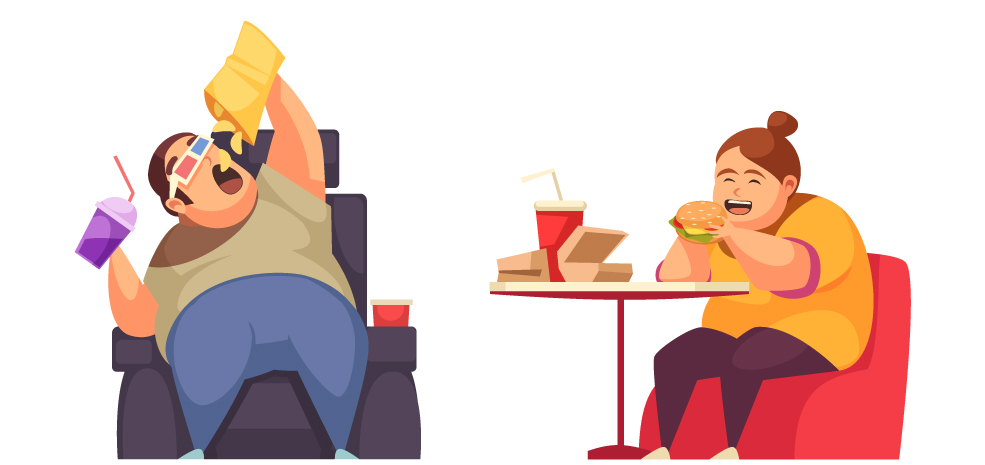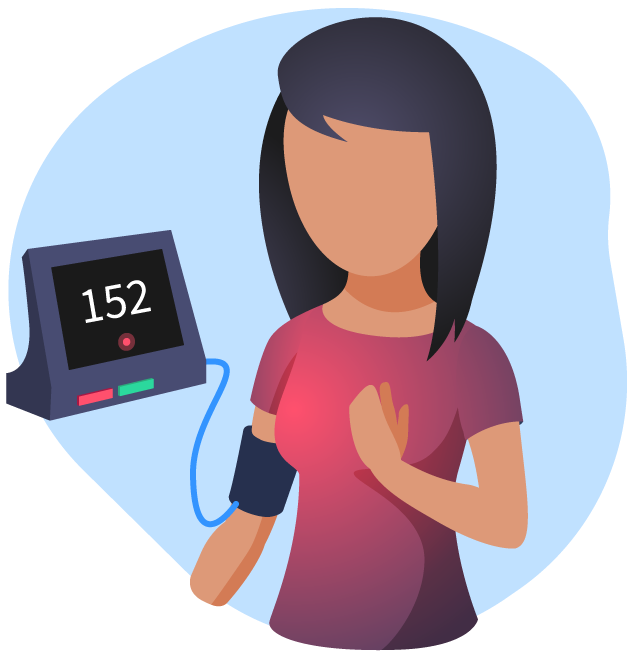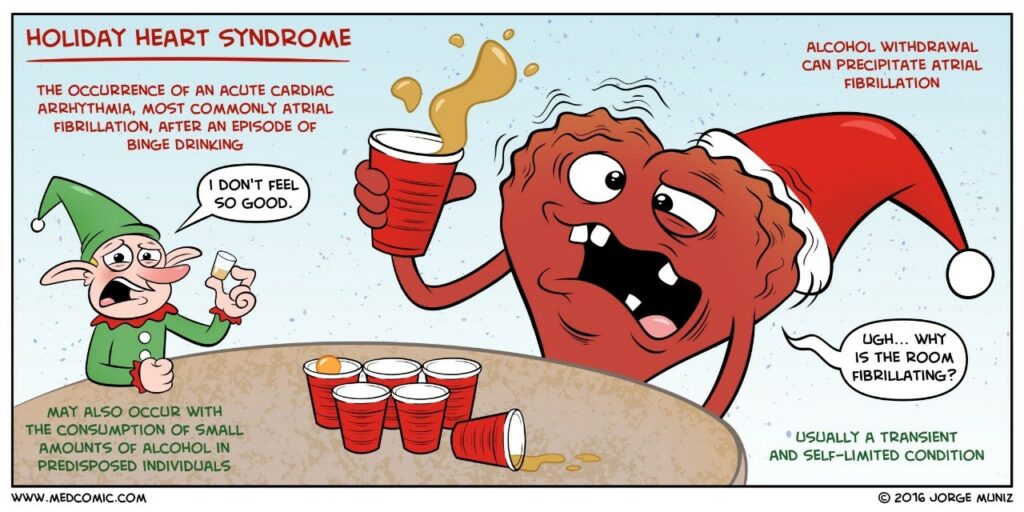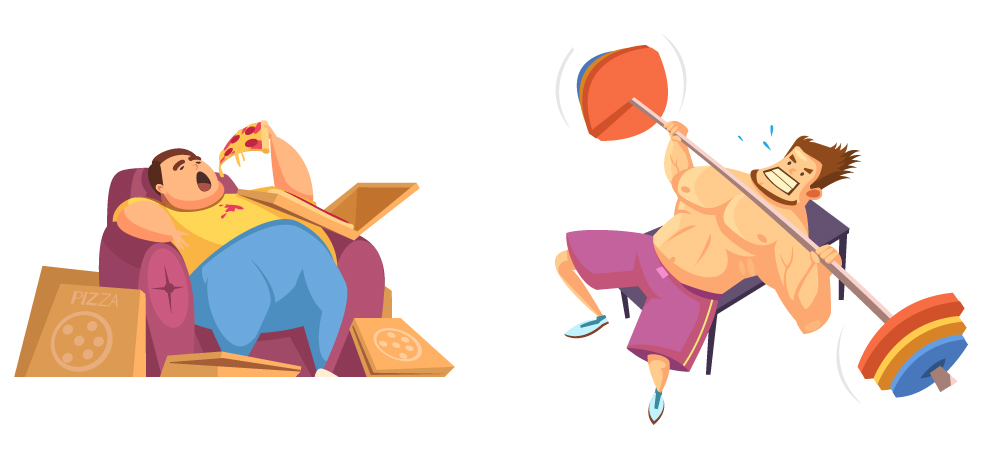It is often difficult to find a pattern to define which situations you’ll get episodes of atrial fibrillation. However, we know of certain contexts where there is a statistically proven increase in risk of episodes of atrial fibrillation. We will cover the most most important of these in this post.
Weight
There are several studies that have shown that atrial fibrillation occurs more frequently in overweight people than in people of normal weight. Obesity is assessed, among other things, by calculating the so-called “body mass index (BMI)”. You can calculate your own BMI by taking your weight in kilograms and dividing your height by meters up in weight twice. If you weigh 82 kg and are 1.75 m tall, your BMI will be 82: 1.75 = 46.86. Then divide once more by your height in meters: 46.86: 1.75 = 26.8. Your BMI is thus 26.8, which can be rounded up to 27. This corresponds to a slight overweight. At normal weight, the BMI is at most 25.

It has been shown that on average there is a 8% increased risk of atrial fibrillation for every BMI point above 27. This means that if you weigh 100 kg and are 1.75 m tall (BMI = 33), your risk of developing atrial fibrillation will be increased by 6 x 8% – or by 48%.
The good news is that weight loss results in a reduction in the incidence of atrial fibrillation. And, what is important, leads to better results of both ablation treatment and of medical treatment for atrial fibrillation. Thus, if you are overweight, a weight loss after ablation treatment can improve the outcome of your treatment by up to five times.
Obstructive sleep apnea
Obstructive sleep apnea is the term for a condition in which one often takes long pauses in breathing during sleep and then resumes breathing in large and deep gasps. Often combined with a pronounced tendency to snore. You can examine for obstructive sleep apnea with measuring equipment, but often your spouse can make the diagnosis – it is she or he who anxiously waits at night for you to breathe again after a long break.

If you have obstructive sleep apnea, you have an increased risk of atrial fibrillation.
Obstructive sleep apnea can be treated. Often it is effective to treat with a sleep mask, exhaling against a slight back pressure. It is called “CPAP”.
CPAP treatment of people with obstructive sleep apnea gives a better result after ablation treatment for atrial fibrillation.
Hypertension

If you have high blood pressure, your risk of atrial fibrillation is increased 4-6 times. This is also why it is important to get your blood pressure normalized. Hypertension often requires medical treatment.
If high blood pressure is treated effectively, the result of ablation treatment for atrial fibrillation will be better.
Alcohol consumption
In principle I would not advise against moderate drinking for individuals with atrial fibrillation.
There are several studies that have shown that a daily intake of 3 “units” or more increases the risk of developing atrial fibrillation. And increases the risk of atrial fibrillation attacks if one already has a tendency to flicker. However, 3 units is almost equivalent to half a bottle of wine and very few people have such a high alcohol consumption daily. There is no definite link between small amounts of alcohol intake – for example 1-2 glasses of wine a couple of times a week – and atrial fibrillation.

On the other hand, we know that the risk of atrial fibrillation is significantly increased if you get drunk. So this should of course be avoided if one has already had episodes of atrial fibrillation in the past. In fact, binge drinking should be avoided at all costs.
Physical activity and sports
The connection between physical activity and atrial fibrillation is a bit complicated. Both those who are very inactive and those who are very active have an increased risk of atrial fibrillation.

Moderate activity, on the other hand, is good. Both because moderate physical activity carries less risk of getting atrial fibrillation and because moderate physical activity makes it easier to deal with the condition.
Diet and supplements
I do not know of any good and solid studies that can demonstrate any definitive link between particular compositions of diet and the occurrence – or prevention – of atrial fibrillation.

There is a lot of information online about the effects of various dietary and mineral supplements. However, there is not really anything that has been proven to work through serious systematic scientific studies.
Avoid stress
Some people with recurrent atrial fibrillation experience that stressful situations can trigger attacks. For example, in connection with holiday trips, family visits and other social events. When you travel, you can expose yourself to factors that can trigger atrial fibrillation. You may be “tired” or exhausted. The stress you expose yourself to by traveling, along with changes in sleep patterns, can trigger a stressful situation in the body with increased levels of stress hormones that can help provoke the flicker.
Tips:
- Make sure you get a good night’s sleep
- Make sure you drink enough (and not too much alcohol…)
- Do not skip meals
- Prepare mentally for unexpected challenges, such as flight changes
- Avoid rushing, take your time and be organized and well prepared

Excessive stress can affect your heart through the body’s production of adrenaline-like hormones. Becoming more aware of which situations increase your stress level and trying to avoid these, or at least prepare for them, can help reduce your risk of getting atrial fibrillation. Mindfulness exercises and meditation can help reduce stress.
More information on the various risk factors associated with atrial fibrillation can be found here.